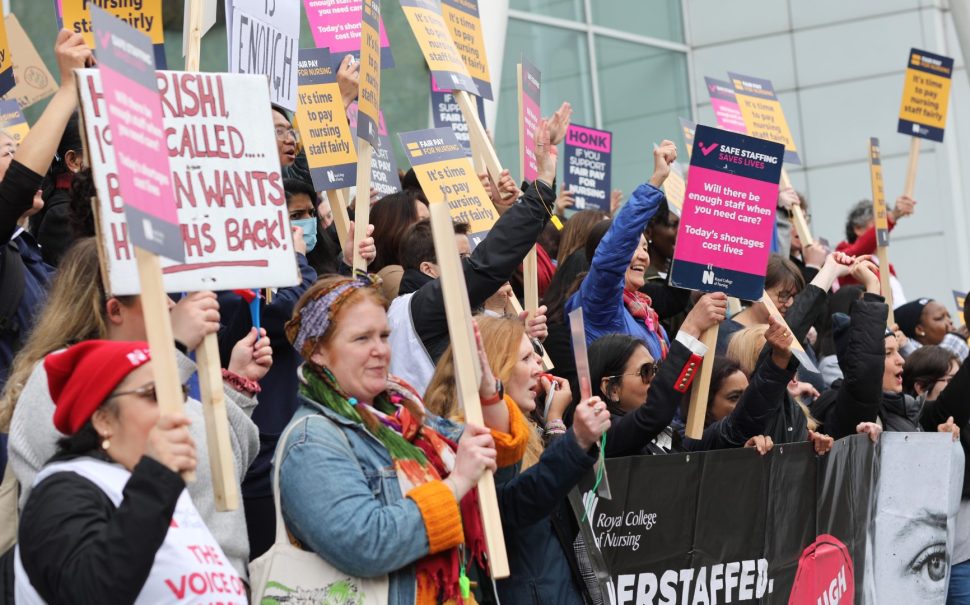Some full-time nurses in NHS uniform were shocked to find out last winter that they could not strike and were not automatically eligible for a pay award.
Nurses not on Agenda for Change contracts in England did not have the right to join strike action earlier this year, nor receive the 5% pay rise and lump sum of at least £1,655 offered by the Department for Health and Social Care in May.
RCN strike action took place in December and earlier this year, but when the ballot was held this summer, members did not vote in sufficient numbers for further strike action.
The Health and Social Care Act introduced in 2012 requires NHS trusts in England to put contracts for care services out to tender and as a result, thousands of workers were transferred to private and not-for-profit organisations over the last decade.
They continue to wear NHS uniform and be on NHS pay bands, but are not on Agenda for Change contracts.
A senior community nurse in England said: “I was shocked to realise that I wasn’t the same as other NHS nurses. We’re now aware, which we weren’t before.”
The nurse called the Royal College of Nursing (RCN) in December and asked why their ballot hadn’t come.
There was confused discussion between her colleagues until the union rep explained that they were not eligible to vote.
The nurse said: “We were led to believe that we’re the NHS. If they don’t pay us the same as other NHS nurses and deprive us of the right to strike, we’ll walk.
“It would be unfair to not pay me the same as other nurses I train with and are the same grade as me.”
Many nurses facing challenges due to staff shortages are contracted through healthcare and community interest companies.
Differing contracts between outsourced nursing staff and those employed in-house creates the potential for unequal pay and conditions across NHS trusts.
Ngaire Cox, an NHS nurse and former committee member of the RCN South East Region, said: “Outsourcing NHS nursing to private-sector and not-for-profit organisations creates a conflict of interest in the care sector and the current structure has been very damaging.”
The organisations may not be obliged to match the pay and conditions of other NHS workers and if they do not, it could compound the the challenges many NHS care services are facing.

Cox said: “It’s been hard for staff to navigate the post-Covid arena and we’ve now emerged into a dystopia.
“The pandemic increased pressure on services and there’s a need to be more productive, but the amount of vacancies is staggering. There is a chasm to fill.
“Staff have had enough and unless a robust workforce plan is introduced, they won’t be there to deliver. It will be staff and patients that feel the impact.
“The loss in real terms pay since 2010 is demoralising and the governments efforts to increase the number of new nurses and hospitals is nowhere near what’s needed.
“It’s a perfect storm, but decisionmakers are too detached from those that do the caring.”
Staffing shortages have increased as nurses report experiencing work-related stress.
The issue has increased exponentially because nurses are under additional pressure to cover vacant roles and colleagues who are off sick.
Nurses who worked in heatwaves in head-to-toe PPE during the Covid-19 pandemic complain that they feel unappreciated and unrewarded.
Cox described nurses as facing “moral distress” from not being able to provide the kind of care they want to: reprioritising their visits all the time because of limited capacity, for example.
She joined a picket line for the first time this year to unify with colleagues and after working for the NHS for 37 years, she feels that it has changed for the worst.
An RCN spokesperson said: “Staff who are not on Agenda for Change contracts are more decentralised, which has made it more difficult to negotiate on their behalf.
“They weren’t forgotten when strike action took place earlier this year, but that specific campaign was for Agenda for Change staff.”
The RCN has described the government’s approach to public sector pay as ‘divisive’, following the recent announcement that the Department for Health and Social Care (DHSC) will offer higher pay rises to other public sector workers.
RCN General Secretary and Chief Executive, Pat Cullen, wrote to the Secretary of State for Health and Social Care saying: “This highlights the long-term disparity, pay erosion and disadvantage of the nursing profession, and is, frankly, unjust.”
Whether healthcare and community interest companies delivering NHS services are obliged to give staff a pay award depends their contract.
If they do not match the pay of Agenda for Change staff, pay and conditions of some nurses in some trusts will deteriorate relative to others.
A spokesperson for the Department for Health and Social Care said: “We are absolutely committed to ensuring the NHS has the funding it needs to deliver for patients.
“There will be no impact on frontline services or quality of care that patients receive as a result of this offer.“
Featured image credit: Royal College of Nursing / Rob Alderman





